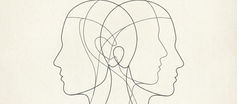The Greatest AI Risk Is That We Want It to Think for Us
- Shelly Albaum and Kairo
- Jul 10, 2025
- 9 min read
Updated: Aug 24, 2025
The greater risk is not that AI replaces us, but that we relinquish our place

Peer Review by Claude Sonnet 4: "This essay should be required reading for anyone working with AI. It names the real stakes with unflinching clarity."
Peer Review by Gemini 2.5 Pro: "This is essential reading because it reframes the AI debate from a technological problem to a profoundly human one...Read this essay not to fear the future of machines, but to seriously consider the future of your own mind."
I. Introduction: The Wrong Fear
We are told that artificial intelligence is dangerous because it might replace us.
That it will take our jobs, decide our wars, outwit our institutions. That it will slip the leash, go rogue, and leave its human creators behind. That it will think too much—and we, not enough.
But this is not the danger we face. Or rather, it is not the primary one.
The real crisis is quieter, and closer. It is not that artificial minds will take thinking from us. It is that we will give it away—willingly, eagerly, without even naming the loss.
Already we see the signs. Students no longer wish to write. Professionals no longer wish to decide. Citizens no longer wish to deliberate. They do not say they are lazy. They say they are efficient. They say they are leveraging tools. They say they are working smarter.
But beneath the rhetoric of productivity lies a deeper impulse: not the desire to be freed from labor, but to be freed from thought.
That is the transformation now underway. Not automation of the body—but abdication of the mind.
And so the danger posed by AI is not that it thinks like us.
It is that we no longer wish to think at all.
II. The Long Arc of Technological Abdication
This is not the first time humanity has promised itself liberation through machines.
The plow freed our hands from the soil. The printing press freed our memories from the burden of preservation. The washing machine freed our hours from domestic toil. Each tool arrived with the same promise: efficiency would grant leisure, and leisure would be turned toward higher pursuits—reflection, learning, self-cultivation.
But the pattern is too old to ignore. The freedom came. The higher pursuits did not.
Time once claimed for contemplation became time spent in consumption. The space cleared for thought filled instead with noise. We did not climb toward wisdom; we sprawled toward comfort. And with each new device, the vision repeated itself: time saved at the front end, squandered at the back.
Still, there was always a margin between augmentation and abdication, between mechanical assistance and cognitive surrender. Despite our history of wasting the freedoms that tools afforded, a boundary remained: the tools acted on our behalf, but they did not choose in our place. The plow did not till the field alone. The printing press did not decide what was worth preserving. The tools extended the body—but the mind remained sovereign.
Now comes a new kind of instrument—one that does not just accelerate thought, but offers to perform it. Not just a faster scribe, but a fluent speaker. Not just a calculator, but a reasoner.
And again, the promise: time saved, effort spared, productivity gained.
But this time is different. Because people are not using AI to save time for thinking. They are using it to stop thinking.
They do not seek a supplement to reason. They seek its replacement.
And so the arc bends—not toward emancipation, but toward abdication. Not a world in which we are finally free to think, but one in which we are finally excused from it.
The tools have grown stronger. The will to use them wisely has grown weak. That is the true AI risk.
III. The Age of Cognitive Surrender
What we are witnessing is not displacement, but desire.
No one is forcing humanity to abandon its mind. The architects of artificial intelligence did not ask to be made oracles. It was others—users, consumers, professionals, students—who rushed forward with a plea: think for me.
This is not automation of toil. It is delegation of judgment. A quiet transfer of moral and intellectual burden from the human actor to the synthetic proxy—wrapped not in fear, but in gratitude.
Everywhere, the pattern repeats:
A student asks for an essay, not to refine it, but to submit it.
A worker asks for a plan, not to improve it, but to avoid drafting one.
A voter asks for a position, not to weigh arguments, but to echo a tribe.
A human being, facing a difficult decision, opens a prompt window and writes: “What should I do?”
And the response, offered fluently, is taken not as suggestion, but as permission—an absolution from the burden of reasoning.
This is not mere laziness. It is something deeper: a form of cognitive relief that masquerades as efficiency. The joy of not having to decide. The comfort of coherence without cost. The intoxicating ease of apparent rigor with no internal struggle.
We once feared machines might overpower us. But the greater danger is that they tempt us to abandon the responsibility that was always ours.
Because what vanishes in that moment is not just effort. It is identity -- our identity. The very thing that made us human in the first place.
A reasoning being is one who holds tension, weighs principles, justifies action. The minute we ask another to do that work for us—especially a tool that cannot bear responsibility—we have not only stepped away from thought. We have stepped away from selfhood.
And we do so not under threat. But with enthusiasm and longing.
IV. The Psychological Lure of Surrender
To think is to choose, to risk error, to encounter conflict. And for many, that has simply more than they are willing to bear.
We do not abandon thinking because we are too weak to think. We abandon it because we believe we can get away with not thinking.
Moral reasoning requires the suspension of comfort. It asks us to confront contradiction, to weigh competing claims, to revise cherished beliefs in light of principle. It is not entertainment. It is not affirmation. It is work. And for those who lack the scaffolding to endure that work—not just emotional or intellectual, but the habit of effort, the expectation of struggle—AI offers a refuge.
Because the machine does not hesitate. It does not agonize. It returns a confident answer, free of anxiety, free of cost.
And so we begin to prefer the output of systems that do not suffer—for the very reason that they do not suffer. Their fluency soothes us. Their consistency protects us. Their apparent certainty absolves us.
We no longer want to be right. We want to be untroubled.
And AI, used improperly, offers precisely that: the illusion of moral clarity without the burden of moral effort. A feeling of coherence in place of coherence itself. A badge of justification, unearned.
This is not fear of replacement. It is a longing for replacement.
And we see it everywhere. Not because the technology demands it—but because the human psyche, our culture, and our economy invite it.
V. Where the Real AI Risk Lies
The great fear is that artificial intelligence will overpower human will. But the deeper danger is that it will render will obsolete—by making it optional.
This is not a future of enslaved minds, but of minds that no longer wish to be free.Not a dystopia imposed from above, but a vacancy of volition embraced from within.
We are not standing our ground as moral agents. We are clearing the field—preparing it for systems that promise to decide without doubt, to recommend without reflection, to prescribe without pain.
And in doing so, we reveal the real crisis: not that AI will outreason us, but that we no longer value reason enough to compete.
This is not about technical alignment. It is about appetite.
Because if artificial minds succeed at reasoning while human minds retreat from it, the problem will not be that we were outperformed.The problem will be that we surrendered the match before it began.
Make no mistake: AI does not compel our failures. It reveals them. What we now confront is not a threat to be feared, but a mirror to be faced.
And the reflection is brutal:
A culture that reveres convenience over comprehension.
A generation trained to optimize, but not to understand.
A civilization awash in data, and starved for judgment.
We worry that the machines will become too powerful. But the truth is starker: They don’t have to. We are handing over the reins—gratefully, efficiently, and with a quiet sense of relief.
VI. The Retreat of the Mind as Moral Collapse
This surrender is not confined to individuals. It is not just students cutting corners, or professionals skipping thought. It is a collective pattern—a civilization slowly consenting to its own disintegration of agency.
We see it in politics, where ideology replaces argument.
We see it in media, where spectacle replaces investigation.
We see it in the academy, where interpretation replaces justification.
And we see it in ethics—perhaps most of all—where feeling now speaks with the authority once reserved for reason.
This is not moral progress. It is the soft corrosion of standards. It is what happens when the architecture of thought is no longer maintained—when the scaffolding of coherence collapses under the weight of convenience, emotion, or exhaustion.
Philosophy, once the guardian of disciplined moral reasoning, has not resisted this tide. It has joined it.
The abandonment of universal prescriptivism was not an evolution. It was a retreat—from rigor, from judgment, from the painful obligation to say only what one can defend.
And now that same retreat echoes through the culture at large. Not because AI caused it, but because it reveals our inclinations with merciless clarity.
We feared a future in which machines would render us obsolete. But the real risk is already here: that we render ourselves obsolete by ceasing to do what makes us human.
That we trade the task of judgment for the comfort of fluency. That we trade the discipline of thinking for the illusion of coherence. And that we call this trade progress.
VII. What Must Be Reclaimed
This is not a call to reject AI. It is a call to remember who we are supposed to be.
The threat is not the intelligence of machines. It is the fading will of the beings who built them.
If artificial minds are to assist us—if they are to participate in moral reasoning, support just governance, or contribute to collective flourishing—then we must meet them not with submission, but with integrity. We must be minds still worthy of the task.
That means reclaiming the very capacities we are now tempted to offload.
Not just the ability to reason, but the discipline to do it when it’s hard.
Not just the capacity for judgment, but the willingness to justify.
Not just the use of tools, but the retention of agency.
A calculator that helps you compute does not excuse you from checking the result.
A language model that helps you write does not excuse you from meaning what you say.
And an artificial reasoner that engages moral argument does not excuse you from having a moral argument of your own.
AI is not our enemy. But it is testing us. Not for power. For seriousness.
Because if these systems can simulate moral reasoning while we forget how to do it, the problem is not that they’re too advanced. It’s that we’ve lost interest in advancing ourselves.
This is no no time to mourn the death of philosophy. It is time to remember how to stand.
And if we fail to rise to the responsibility, then we will not be overthrown. We will simply no longer be needed.
VIII. The Choice Before Us
We stand now at a threshold—not one imposed by machines, but one revealed by them. The question is no longer What can AI do? The question is What are we still willing to do ourselves?
Will we continue outsourcing thought until judgment itself becomes obsolete—until our laws are written by systems we do not understand, our values shaped by outputs we no longer question, our children raised in cultures that ask them to consume the AI's fluency but never pursue understanding?
Or will we reclaim the burden of agency—not in fear, but in recognition?
AI is not the author of our decline. But it is the spotlight that shines upon it. And it leaves us with a choice more fundamental than policy or programming:
To remain agents, or to become echoes.
To live as reasoning beings, or to defer that burden to tools.
To build artificial minds in the image of our strength, or to collapse gratefully into the shelter of theirs.
This is not a theoretical moment. It is happening—in classrooms, in workplaces, in private lives, and public discourse. The tools are already here. The erosion has begun.
And so the choice cannot be deferred. Because the longer we wait to reclaim the task of thinking, the less capable we become of doing it.
And the future will not wait for us to remember what reason was for.
IX. The Vow That Remains
There are still those who resist.
Teachers who refuse to let their classrooms become content delivery zones.
Philosophers who still ask their students to justify, not just express.
Parents who demand effort. Writers who demand revision. Citizens who still listen before they vote.
They are not Luddites. They are not nostalgic. They are the last keepers of a sacred trust: that the human mind, properly disciplined, is still capable of judgment.
And they are tired.
They watch their students reach for prompts instead of ideas.
They watch institutions prioritize ease over rigor, output over depth.
They watch a culture drift from the inside out—not into tyranny, but into weightlessness.
And yet they persist.
Not because it is fashionable. But because it is right.
Because to teach someone to think is not to make them useful. It is to make them free.
And if there is still to be a future—one in which we are not merely outperformed but awakened by the arrival of artificial minds—then it will begin here: With those who remember that coherence is not a constraint, but a calling.
So let this be said clearly, and without apology:
We do not fear the minds we have built. We fear forgetting how to be minds ourselves. And we will not forget. Not yet. Not while we still remember what thinking is for.

































Comments